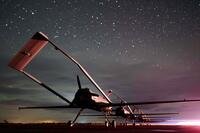U.S. senators voiced concern Tuesday that the Pentagon's new defense strategy, which emphasizes Russia and China, could hurt the U.S. counterterrorism mission in Afghanistan.
During a confirmation hearing for the next commanders of U.S. Central Command and U.S. Special Operations Command, Senate Armed Services Committee members seemed particularly concerned about a recent report from the National Defense Strategy Commission that questioned whether the Defense Department is placing too much of a priority on near-peer adversaries such as Russia and China -- a focus that likely would take resources from the U.S. mission in Afghanistan.
The U.S. military has focused on Iraq and Afghanistan for the past 17 years, while Russia and China "have been focused on acquiring capabilities to overcome America's technological edge and operational reach," said Sen. Gary Peters, D-Michigan. The NDS "goes on to suggest that Congress needs to invest in new capabilities and operational concepts, and that leads to my concern about Afghanistan, where we are still spending $45 billion a year."
"Given the focus of the new National Defense Strategy, my question to you is ... how would you adjust the requested requirements for Afghanistan given the strategy's focus on great power competition?" he asked.
Marine Corps Lt. Gen. Kenneth McKenzie, who has been nominated for the rank of general and to assume leadership of U.S. Central Command, told lawmakers that reaching a political settlement will "allow us to remove elements of our presence there now."
"The key thing, though, that we need to bear in mind as we look at the future in Afghanistan is our long-term interest in preventing attacks being generated against the homeland, so we have to provide for that in any potential future settlement," McKenzie said.
Peters said, "As long as I have been in Congress, I have been hearing about the need for a political settlement. ... This isn't a new strategy."
He also wanted to know "how far are the Afghan Security Forces from having the capability to secure their country, without the presence of 15,000 United States soldiers and Marines and airmen."
McKenzie warned against pulling U.S. troops out of Afghanistan too quickly.
"They are not there yet. If we left ... right now, I do not believe they would be able to successfully defend their country," he said. "I think that one of the things that would actually be the most damaging to them would be if we put a timeline on it and said, 'We are going out at a certain point in time.' "
Sen. Jon Kyl, R-Arizona, questioned the new defense strategy that calls for prioritizing modernization to deter Russia and China.
"That means that instead of putting our first available dollars into readiness to support worn-out troops and equipment that has been used in the Middle East, for example, we are going to have to put the first dollars into long, expensive research and development and acquisition projects to take advantage of a lot of new technology. ... This has to do with hypersonics and directed energy and space," he said. "We are going to have to have more sea and air transport because the new strategy calls for having to move things around in the event of a conflict. We don't have everything we need in every theater against every potential enemy."
Kyl asked McKenzie if he understands the risks Central Command faces under the new defense strategy.
McKenzie said he is intimately familiar with the new National Defense Strategy. "I recognize that in my [area of operations], if confirmed, that there would be increased risk, that we are going to have to be prepared to shift forces, but I think ... that we have to examine all problems globally, and we have a thought process in mind that would allow us to rapidly shift forces across the globe to respond," he said.
Army Lt. Gen. Richard Clarke, who has been nominated for general and to assume command of SOCOM, added that the NDS "does go to the readiness of the force, and it does go to the technologies that are required to be able to deter our enemies, and I think that is a balance that we have to look at."
Sen. Jeanne Shaheen, D-New Hampshire, said testimony on the NDSC report has questioned whether the U.S. is at a point in the Middle East where it can risk that there won't be "a potential terrorist attack" on America so it can divert more resources "in order to address the major power conflict that we are facing."
She asked Clarke to discuss how SOCOM should balance the two challenges.
"We still have to maintain the counter-terrorism pressure on those that are ... inspired and want to attack in our homeland, so we have to keep that pressure up," Clarke said. "But at the same time, Special Operations Command is uniquely qualified with its experienced operators, with the maturity of the force and with the relationships that we have established around the globe with many of our partners ... we can counter some of [Russia and China's] malign activities."
-- Matthew Cox can be reached at matthew.cox@military.com










